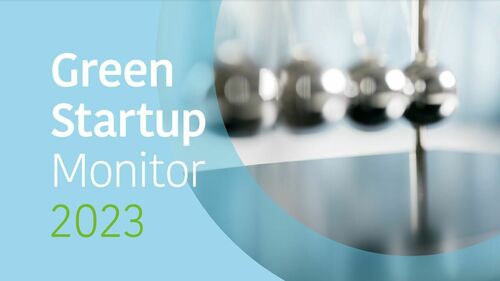Ecological sustainability is becoming a relevant factor for more and more start-ups when setting up and developing their business. The Green Startup Monitor 2023 by Startup-Verband and Borderstep Institute shows how green startups bring impact and growth together. The biggest challenges lie in the area of financing and in measuring the sustainability impact, i.e. the ecological impact.
Share of green start-ups reaches new high
At 35 percent, the share of green companies among German start-ups has made a significant leap compared to the previous year (29 percent) and reached a new high. Sustainable action is becoming more and more prevalent across the start-up landscape. It is also noteworthy that the share of female founders among green start-ups is 23 percent, higher than among non-green start-ups (18 percent). Women identify more strongly with sustainability goals and align their products and business models more frequently with these.
Less money for green start-ups
The financing climate in the German startup ecosystem has cooled over the course of the last year – this decline is particularly evident among green startups. Raising capital has become more difficult for many of the startups: 46 percent of green startups see this as one of the key challenges, compared to 37 percent in the previous year and 34 percent for non-green startups. This clearly shows that special attention must continue to be paid to financing green business models in order to advance the transformation in the long term.
Green start-ups are much more aware of their sustainability impacts – measurement is still a problem
This year’s report focuses for the first time on the question of practical implementation by looking at impact competence. Impact competence refers to the ability to record and manage the ecological and social impacts of entrepreneurial activity.
Here, green start-ups are already much further ahead: 52 percent clearly agree that they know their positive sustainability impacts; with regard to negative sustainability impacts, the value is 29 percent. Knowledge of their own impact is most pronounced among green start-ups with a particularly high degree of innovation and a strong growth orientation.
When it comes to measuring and communicating these sustainability impacts, however, there is still a need to catch up: only 15 percent of the start-ups overall and 27 percent of the green start-ups state that they can clearly prove the sustainable impact of their business activities with data and facts.
Quote Franziska Teubert (Managing Director Startup Association):
“The share of green companies among German startups has reached a new high. In view of the urgently needed transformation towards a climate-neutral economic system, this is good news. Start-ups quickly bring sustainable innovations into practice and we should use this speed to finally achieve our climate goals. To do this, we need to address the particular challenges of green startups, especially with regard to raising capital. A good example of this is the German government’s Deep Tech and Climate Fund. Well-intentioned, but in practice it still needs optimisation: investments from venture capitalists should also be made possible.”
Quote Prof. Dr. Klaus Fichter (founder and director of the Borderstep Institute for Innovation and Sustainability, professor for innovation management and sustainability at the Carl von Ossietzky University Oldenburg and scientific director of the Green Startup Monitor 2023):
“Around four fifths of all startups in Germany want to have a social or ecological impact. However, in order to fully develop the ecological impact, it is not enough to set sustainability goals. These must be implemented and accompanied by targeted measures and data-based impact monitoring. With the Green Startup Monitor 2023, we are turning the spotlight on the topic of impact competence. Our study is the first worldwide to examine the competence of startups to achieve impact. It shows considerable need for qualification and data.”
Green Startup Monitor
The Green Startup Monitor analyses the importance of German startups that contribute to the ecological goals of a Green Economy with their products and services. It was compiled by the Borderstep Institute and the Startup Association for the fifth time in 2023. The study is based on data collected through an online questionnaire from 1,518 innovative and growth-oriented companies that are less than 10 years old and have their company headquarters in Germany. The Green Startup Monitor was funded by the Deutsche Bundeststiftung Umwelt (DBU) and can be downloaded here from 29 March 2023.
Startup Association
The Startup-Verband is the representative and voice of startups in Germany. It explains and represents the interests, viewpoints and concerns of startups to legislation, administration and the public. It promotes innovative entrepreneurship and carries the startup mentality into society. The association sees itself as a network of start-ups in Germany.
Borderstep Institute for Innovation and Sustainability gGmbH
As an independent and non-profit scientific institution, Borderstep researches the future and examines what will come (innovation) and what will remain (sustainability). The focus is on developing solutions to problems and strategies for action for sustainable economic activity.

